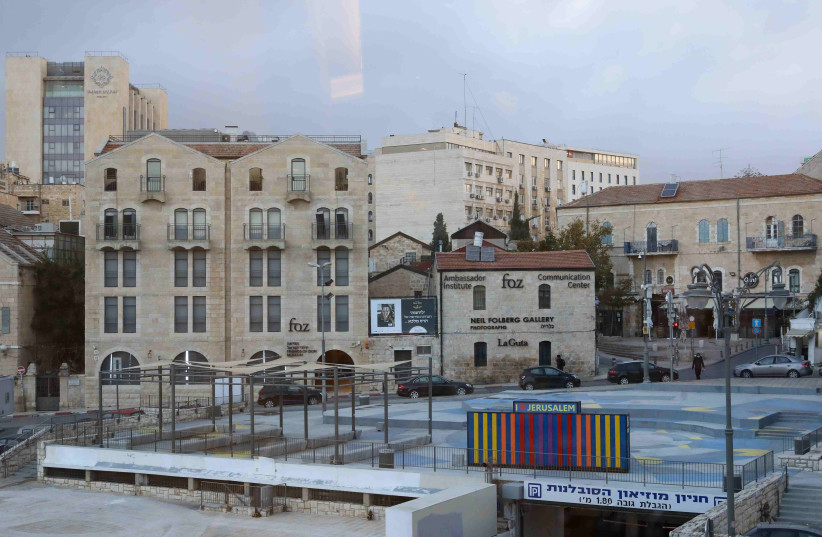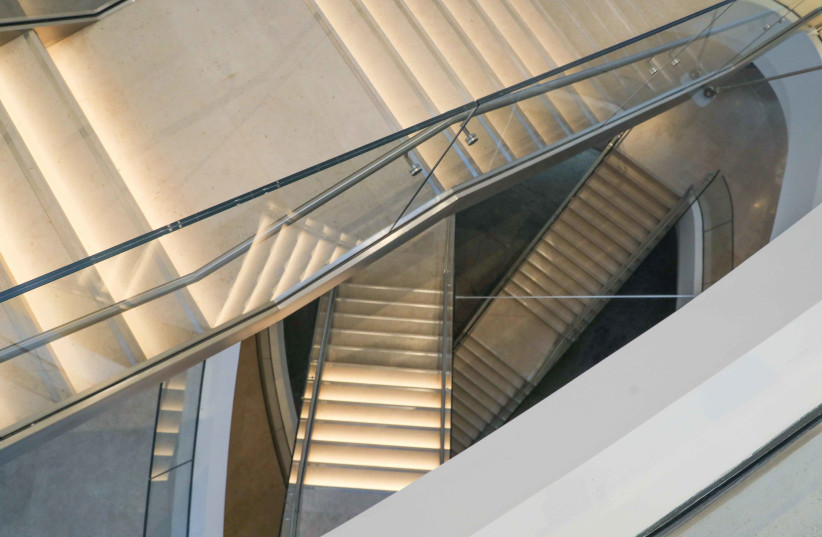The dispute between the Jerusalem Municipality and the Museum of Tolerance regarding the city’s refusal to transfer ownership of a key piece of land to the institution will resume with a hearing at the District Court on Thursday.
Leading up to the hearing, the Jerusalem Municipality sent a harsh letter to the Simon Wiesenthal Center’s executive leadership and board in the United States demanding that the institution immediately open the museum that it has been building in the capital for the last 20 years.
The city's harsh letter
In the letter signed by municipal legal adviser Eliyahu Malka and head of the Properties Branch, Rita Ladizhensky, the city informed the center that its Museum of Tolerance, which was labeled a “white elephant”, must open immediately and that the center will have to begin paying municipal taxes retroactively from September 1.
The letter was addressed to Rabbi Marvin Hier, dean and founder of the Simon Wiesenthal Center and to members of the board including Nelson Peltz, an American billionaire based in Florida, Larry Mizel, a prominent businessman and philanthropist based in Denver, Dawn Arnall, the current chairwoman of the center, and Gordon Diamond, a prominent Canadian businessman and philanthropist.
“At the very core of the City of Jerusalem, the museum structure stands abandoned as a ‘white elephant’ surrounded by fences,” the city wrote in its letter. “The municipality is unable to receive from the museum management in Israel any relevant justification and the reasons for the museum’s failure to open to this day remain a mystery.”

What are the sides arguing about?
At the center of the dispute is the city’s refusal to transfer ownership over Kikar Hahatulot (Cats Square), directly opposite, to the museum. The museum has asked the court to order the city to uphold previous agreements – including with the Israel Lands Authority – to transfer ownership of the plaza. The ILA has taken the side of the museum in the suit against the city.
Despite the prior agreement, the city passed a decision in May to now appropriate the square for student housing. Since then, the city has refused further requests from the museum to hold individual events in the facility.
Museum officials consider the letter as an attempt to pressure the board and the museum executives into withdrawing their lawsuit.
The 20-year construction project has been mired in controversy since the beginning after the builders discovered Muslim graves while digging the foundations. The case went to the Supreme Court where the museum was given the green light to continue. It was forced to spend millions of dollars more than anticipated in clearing the area.
Construction was mostly completed about two years ago but the facility has remained empty, even though the museum says it is prepared to open tomorrow if approval is given. The state-of-the-art institution cost more than $250 million to build. Its upper floors are intended for hosting events and the lower floors are to serve as the museum.
One of the floors is supposed to house a children’s museum, with a 150-seat theater, classrooms, dressing rooms for performers and a small police station.

A modern amphitheater seats more than 1,000 and features an enormous screen and speakers that jump up at the press of a button.
City officials said this week they do not understand why the museum is refusing to open its doors. One argument has been over the issuing of the necessary “Form 4” a standard permit that must be granted for all buildings to be opened for their designated use. Until that permission is granted, a facility does not have to pay municipal tax (arnona).
“Instead of cooperating with the Municipality to advance their shared vision to establish the museum for the best interests of the general public, the museum behaves as if the municipality was its enemy and its criticism of the municipality in various courts and the media is exceptional,” the city officials wrote to the Wiesenthal Center executives.
The museum asked and received special permission in 2021 to host two events despite not having Form 4. The first event was a conference organized by former US ambassador David Friedman and the second was The Jerusalem Post’s annual conference.
The museum responds
In response to the city’s letter, the museum released a statement saying that the purpose of the Tolerance Museum “is to erect a lighthouse of culture and spiritual enrichment to shine from Jerusalem to the world for the advancement of tolerance values.”
“A substantial portion of the museum is ready to open to the public even tomorrow morning. Its opening is subject to a permit from the City of Jerusalem, which we are awaiting. Events that were scheduled to take place in the museum were canceled at the last minute. One of these was an Independence Day event for the public in the Museum amphitheater – which was not approved by the city.”
“The city’s units which are supposed and required to sign Form 4, the certificate of completion of construction, are not doing so due to some improper considerations the purpose of which is to compel the museum to waive its rights.”
“Unfortunately, instead of supporting and respecting the donors, from the world and the United States, particularly those who wish to strengthen Israel’s capital city, the city persists in its negative conduct. It is refusing to vacate areas of land provided to the city for its use over the years by the museum, for no consideration, and refuses to transfer the land title to the Israel Lands Authority, as it undertook to do.”
“The letter sent to the Wiesenthal Center board members lacks content and truth. Its purpose is to try to pressure us to withdraw our lawsuit against the city.”
“The claim against the city is solid and well documented, and the city’s conduct was criticized even by the judge in the case. The museum will stand fast and demand its rights until the city complies with its obligations.”
“We respect the mayor and the city’s institutions and only strive to work together with the city normally and properly,” the museum’s statement concluded.
